PHIL 101: Socrates and the Unexamined Life: A Philosophical Analysis
VerifiedAdded on 2022/11/01
|7
|1552
|51
Essay
AI Summary
This essay delves into the philosophy of Socrates, focusing on his assertion that 'the unexamined life is not worth living.' It begins by unpacking the meaning of this statement and the reasons Socrates asserted it, emphasizing his belief in the importance of self-reflection and the pursuit of knowledge for individual and societal betterment. The essay then explores the implications of accepting this statement as true, drawing parallels to Plato's allegory of the cave and the European Enlightenment to highlight the transformative power of critical inquiry. Furthermore, it addresses potential objections to Socrates' philosophy, such as the disruption of social peace, and presents Socrates' likely rebuttals, emphasizing the value of challenging the status quo for the sake of progress and genuine stability. The essay concludes by reaffirming the progressive and transformative nature of Socrates' emphasis on critical thinking.

Running head: PHILOSOPHY OF SOCRATES
PHILOSOPHY OF SOCRATES
Name of the Student
Name of the University
Author Note
PHILOSOPHY OF SOCRATES
Name of the Student
Name of the University
Author Note
Paraphrase This Document
Need a fresh take? Get an instant paraphrase of this document with our AI Paraphraser
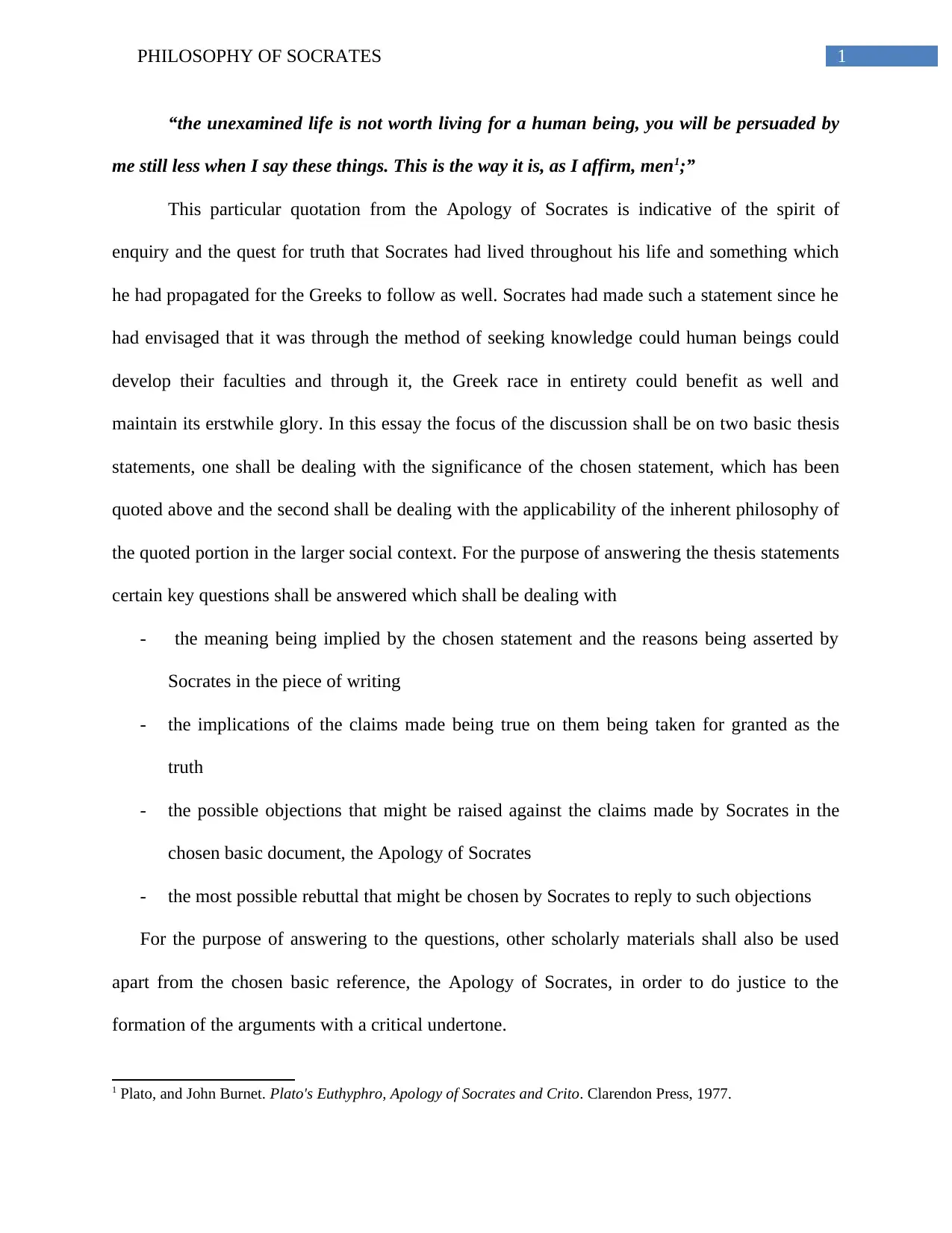
1PHILOSOPHY OF SOCRATES
“the unexamined life is not worth living for a human being, you will be persuaded by
me still less when I say these things. This is the way it is, as I affirm, men1;”
This particular quotation from the Apology of Socrates is indicative of the spirit of
enquiry and the quest for truth that Socrates had lived throughout his life and something which
he had propagated for the Greeks to follow as well. Socrates had made such a statement since he
had envisaged that it was through the method of seeking knowledge could human beings could
develop their faculties and through it, the Greek race in entirety could benefit as well and
maintain its erstwhile glory. In this essay the focus of the discussion shall be on two basic thesis
statements, one shall be dealing with the significance of the chosen statement, which has been
quoted above and the second shall be dealing with the applicability of the inherent philosophy of
the quoted portion in the larger social context. For the purpose of answering the thesis statements
certain key questions shall be answered which shall be dealing with
- the meaning being implied by the chosen statement and the reasons being asserted by
Socrates in the piece of writing
- the implications of the claims made being true on them being taken for granted as the
truth
- the possible objections that might be raised against the claims made by Socrates in the
chosen basic document, the Apology of Socrates
- the most possible rebuttal that might be chosen by Socrates to reply to such objections
For the purpose of answering to the questions, other scholarly materials shall also be used
apart from the chosen basic reference, the Apology of Socrates, in order to do justice to the
formation of the arguments with a critical undertone.
1 Plato, and John Burnet. Plato's Euthyphro, Apology of Socrates and Crito. Clarendon Press, 1977.
“the unexamined life is not worth living for a human being, you will be persuaded by
me still less when I say these things. This is the way it is, as I affirm, men1;”
This particular quotation from the Apology of Socrates is indicative of the spirit of
enquiry and the quest for truth that Socrates had lived throughout his life and something which
he had propagated for the Greeks to follow as well. Socrates had made such a statement since he
had envisaged that it was through the method of seeking knowledge could human beings could
develop their faculties and through it, the Greek race in entirety could benefit as well and
maintain its erstwhile glory. In this essay the focus of the discussion shall be on two basic thesis
statements, one shall be dealing with the significance of the chosen statement, which has been
quoted above and the second shall be dealing with the applicability of the inherent philosophy of
the quoted portion in the larger social context. For the purpose of answering the thesis statements
certain key questions shall be answered which shall be dealing with
- the meaning being implied by the chosen statement and the reasons being asserted by
Socrates in the piece of writing
- the implications of the claims made being true on them being taken for granted as the
truth
- the possible objections that might be raised against the claims made by Socrates in the
chosen basic document, the Apology of Socrates
- the most possible rebuttal that might be chosen by Socrates to reply to such objections
For the purpose of answering to the questions, other scholarly materials shall also be used
apart from the chosen basic reference, the Apology of Socrates, in order to do justice to the
formation of the arguments with a critical undertone.
1 Plato, and John Burnet. Plato's Euthyphro, Apology of Socrates and Crito. Clarendon Press, 1977.
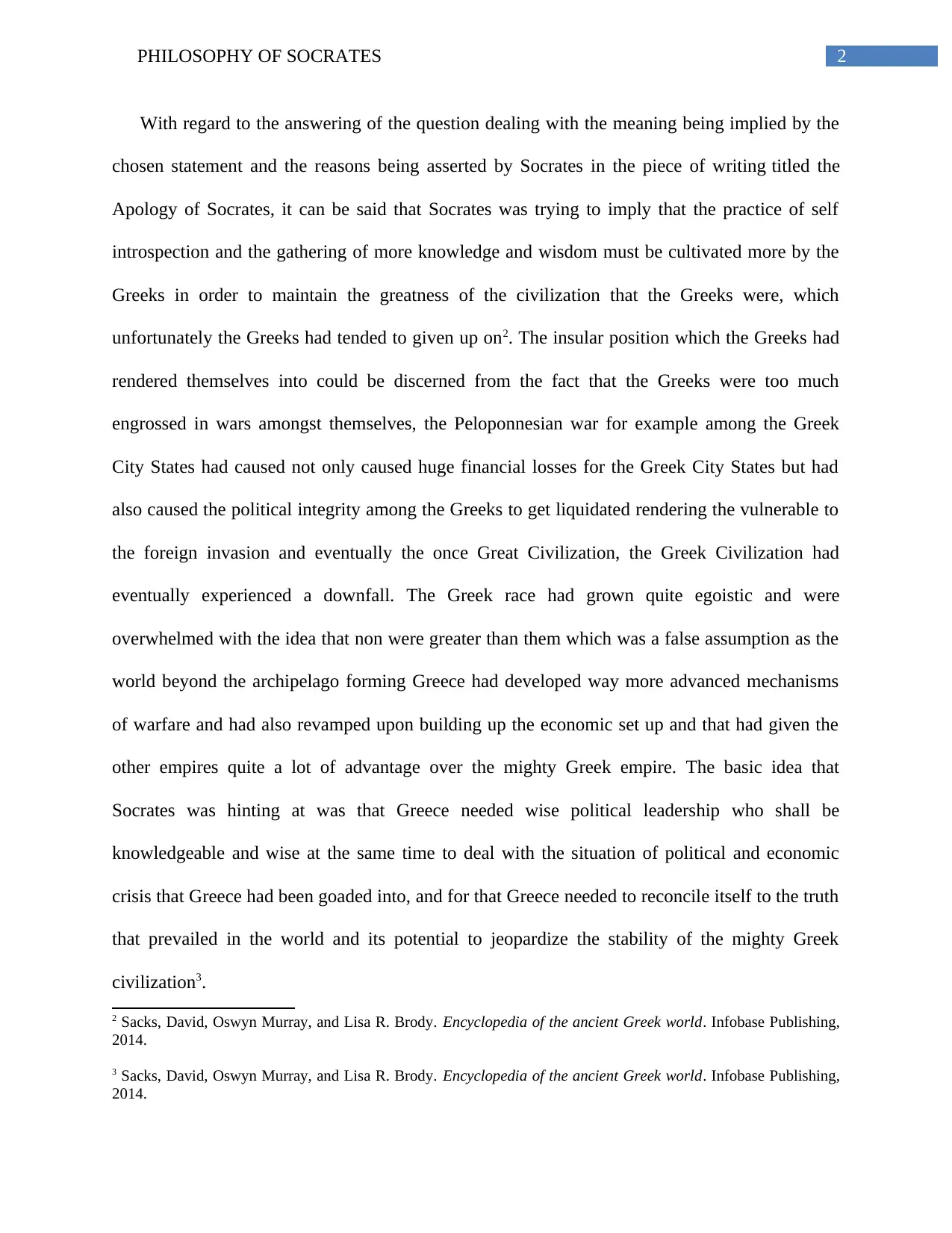
2PHILOSOPHY OF SOCRATES
With regard to the answering of the question dealing with the meaning being implied by the
chosen statement and the reasons being asserted by Socrates in the piece of writing titled the
Apology of Socrates, it can be said that Socrates was trying to imply that the practice of self
introspection and the gathering of more knowledge and wisdom must be cultivated more by the
Greeks in order to maintain the greatness of the civilization that the Greeks were, which
unfortunately the Greeks had tended to given up on2. The insular position which the Greeks had
rendered themselves into could be discerned from the fact that the Greeks were too much
engrossed in wars amongst themselves, the Peloponnesian war for example among the Greek
City States had caused not only caused huge financial losses for the Greek City States but had
also caused the political integrity among the Greeks to get liquidated rendering the vulnerable to
the foreign invasion and eventually the once Great Civilization, the Greek Civilization had
eventually experienced a downfall. The Greek race had grown quite egoistic and were
overwhelmed with the idea that non were greater than them which was a false assumption as the
world beyond the archipelago forming Greece had developed way more advanced mechanisms
of warfare and had also revamped upon building up the economic set up and that had given the
other empires quite a lot of advantage over the mighty Greek empire. The basic idea that
Socrates was hinting at was that Greece needed wise political leadership who shall be
knowledgeable and wise at the same time to deal with the situation of political and economic
crisis that Greece had been goaded into, and for that Greece needed to reconcile itself to the truth
that prevailed in the world and its potential to jeopardize the stability of the mighty Greek
civilization3.
2 Sacks, David, Oswyn Murray, and Lisa R. Brody. Encyclopedia of the ancient Greek world. Infobase Publishing,
2014.
3 Sacks, David, Oswyn Murray, and Lisa R. Brody. Encyclopedia of the ancient Greek world. Infobase Publishing,
2014.
With regard to the answering of the question dealing with the meaning being implied by the
chosen statement and the reasons being asserted by Socrates in the piece of writing titled the
Apology of Socrates, it can be said that Socrates was trying to imply that the practice of self
introspection and the gathering of more knowledge and wisdom must be cultivated more by the
Greeks in order to maintain the greatness of the civilization that the Greeks were, which
unfortunately the Greeks had tended to given up on2. The insular position which the Greeks had
rendered themselves into could be discerned from the fact that the Greeks were too much
engrossed in wars amongst themselves, the Peloponnesian war for example among the Greek
City States had caused not only caused huge financial losses for the Greek City States but had
also caused the political integrity among the Greeks to get liquidated rendering the vulnerable to
the foreign invasion and eventually the once Great Civilization, the Greek Civilization had
eventually experienced a downfall. The Greek race had grown quite egoistic and were
overwhelmed with the idea that non were greater than them which was a false assumption as the
world beyond the archipelago forming Greece had developed way more advanced mechanisms
of warfare and had also revamped upon building up the economic set up and that had given the
other empires quite a lot of advantage over the mighty Greek empire. The basic idea that
Socrates was hinting at was that Greece needed wise political leadership who shall be
knowledgeable and wise at the same time to deal with the situation of political and economic
crisis that Greece had been goaded into, and for that Greece needed to reconcile itself to the truth
that prevailed in the world and its potential to jeopardize the stability of the mighty Greek
civilization3.
2 Sacks, David, Oswyn Murray, and Lisa R. Brody. Encyclopedia of the ancient Greek world. Infobase Publishing,
2014.
3 Sacks, David, Oswyn Murray, and Lisa R. Brody. Encyclopedia of the ancient Greek world. Infobase Publishing,
2014.
⊘ This is a preview!⊘
Do you want full access?
Subscribe today to unlock all pages.

Trusted by 1+ million students worldwide
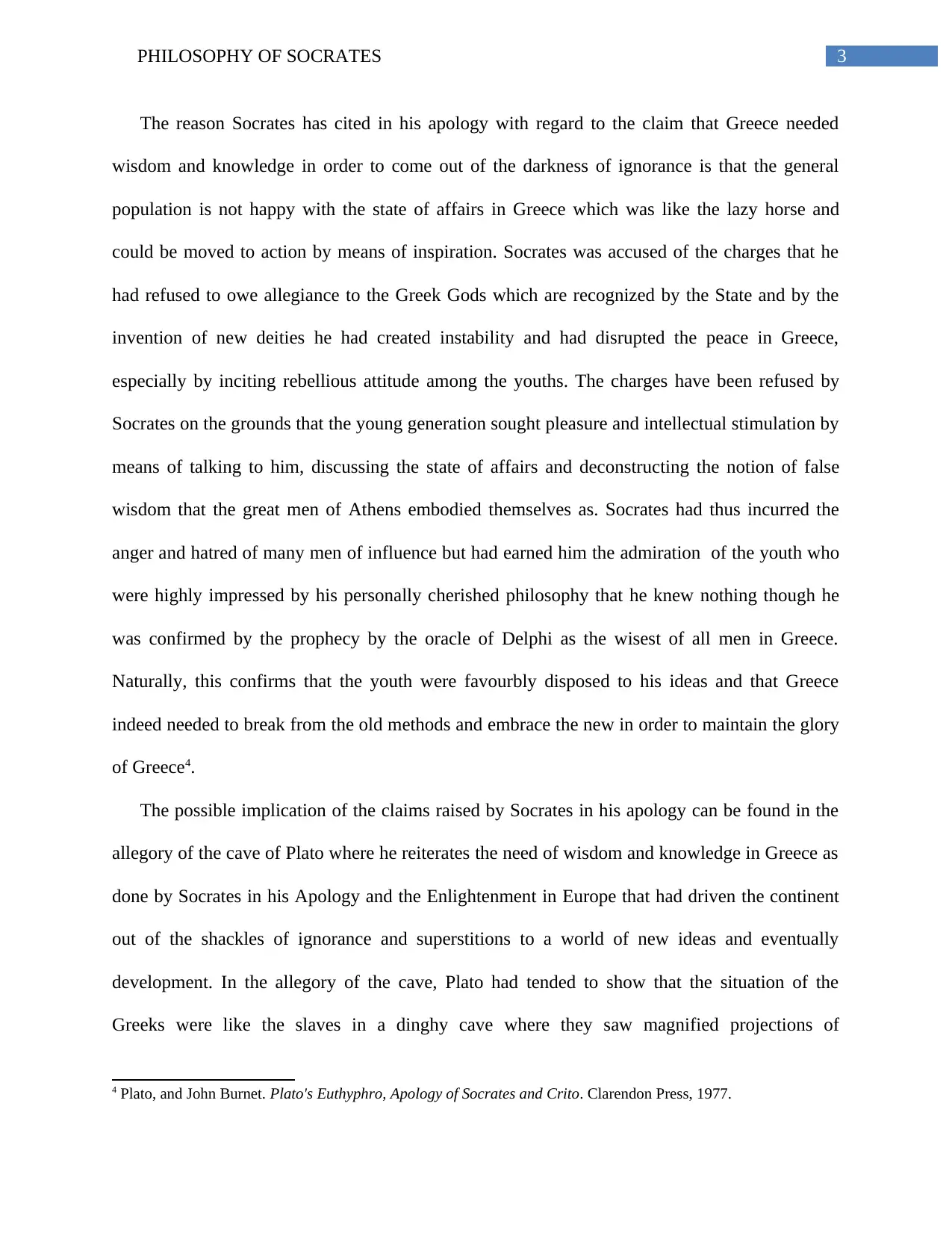
3PHILOSOPHY OF SOCRATES
The reason Socrates has cited in his apology with regard to the claim that Greece needed
wisdom and knowledge in order to come out of the darkness of ignorance is that the general
population is not happy with the state of affairs in Greece which was like the lazy horse and
could be moved to action by means of inspiration. Socrates was accused of the charges that he
had refused to owe allegiance to the Greek Gods which are recognized by the State and by the
invention of new deities he had created instability and had disrupted the peace in Greece,
especially by inciting rebellious attitude among the youths. The charges have been refused by
Socrates on the grounds that the young generation sought pleasure and intellectual stimulation by
means of talking to him, discussing the state of affairs and deconstructing the notion of false
wisdom that the great men of Athens embodied themselves as. Socrates had thus incurred the
anger and hatred of many men of influence but had earned him the admiration of the youth who
were highly impressed by his personally cherished philosophy that he knew nothing though he
was confirmed by the prophecy by the oracle of Delphi as the wisest of all men in Greece.
Naturally, this confirms that the youth were favourbly disposed to his ideas and that Greece
indeed needed to break from the old methods and embrace the new in order to maintain the glory
of Greece4.
The possible implication of the claims raised by Socrates in his apology can be found in the
allegory of the cave of Plato where he reiterates the need of wisdom and knowledge in Greece as
done by Socrates in his Apology and the Enlightenment in Europe that had driven the continent
out of the shackles of ignorance and superstitions to a world of new ideas and eventually
development. In the allegory of the cave, Plato had tended to show that the situation of the
Greeks were like the slaves in a dinghy cave where they saw magnified projections of
4 Plato, and John Burnet. Plato's Euthyphro, Apology of Socrates and Crito. Clarendon Press, 1977.
The reason Socrates has cited in his apology with regard to the claim that Greece needed
wisdom and knowledge in order to come out of the darkness of ignorance is that the general
population is not happy with the state of affairs in Greece which was like the lazy horse and
could be moved to action by means of inspiration. Socrates was accused of the charges that he
had refused to owe allegiance to the Greek Gods which are recognized by the State and by the
invention of new deities he had created instability and had disrupted the peace in Greece,
especially by inciting rebellious attitude among the youths. The charges have been refused by
Socrates on the grounds that the young generation sought pleasure and intellectual stimulation by
means of talking to him, discussing the state of affairs and deconstructing the notion of false
wisdom that the great men of Athens embodied themselves as. Socrates had thus incurred the
anger and hatred of many men of influence but had earned him the admiration of the youth who
were highly impressed by his personally cherished philosophy that he knew nothing though he
was confirmed by the prophecy by the oracle of Delphi as the wisest of all men in Greece.
Naturally, this confirms that the youth were favourbly disposed to his ideas and that Greece
indeed needed to break from the old methods and embrace the new in order to maintain the glory
of Greece4.
The possible implication of the claims raised by Socrates in his apology can be found in the
allegory of the cave of Plato where he reiterates the need of wisdom and knowledge in Greece as
done by Socrates in his Apology and the Enlightenment in Europe that had driven the continent
out of the shackles of ignorance and superstitions to a world of new ideas and eventually
development. In the allegory of the cave, Plato had tended to show that the situation of the
Greeks were like the slaves in a dinghy cave where they saw magnified projections of
4 Plato, and John Burnet. Plato's Euthyphro, Apology of Socrates and Crito. Clarendon Press, 1977.
Paraphrase This Document
Need a fresh take? Get an instant paraphrase of this document with our AI Paraphraser
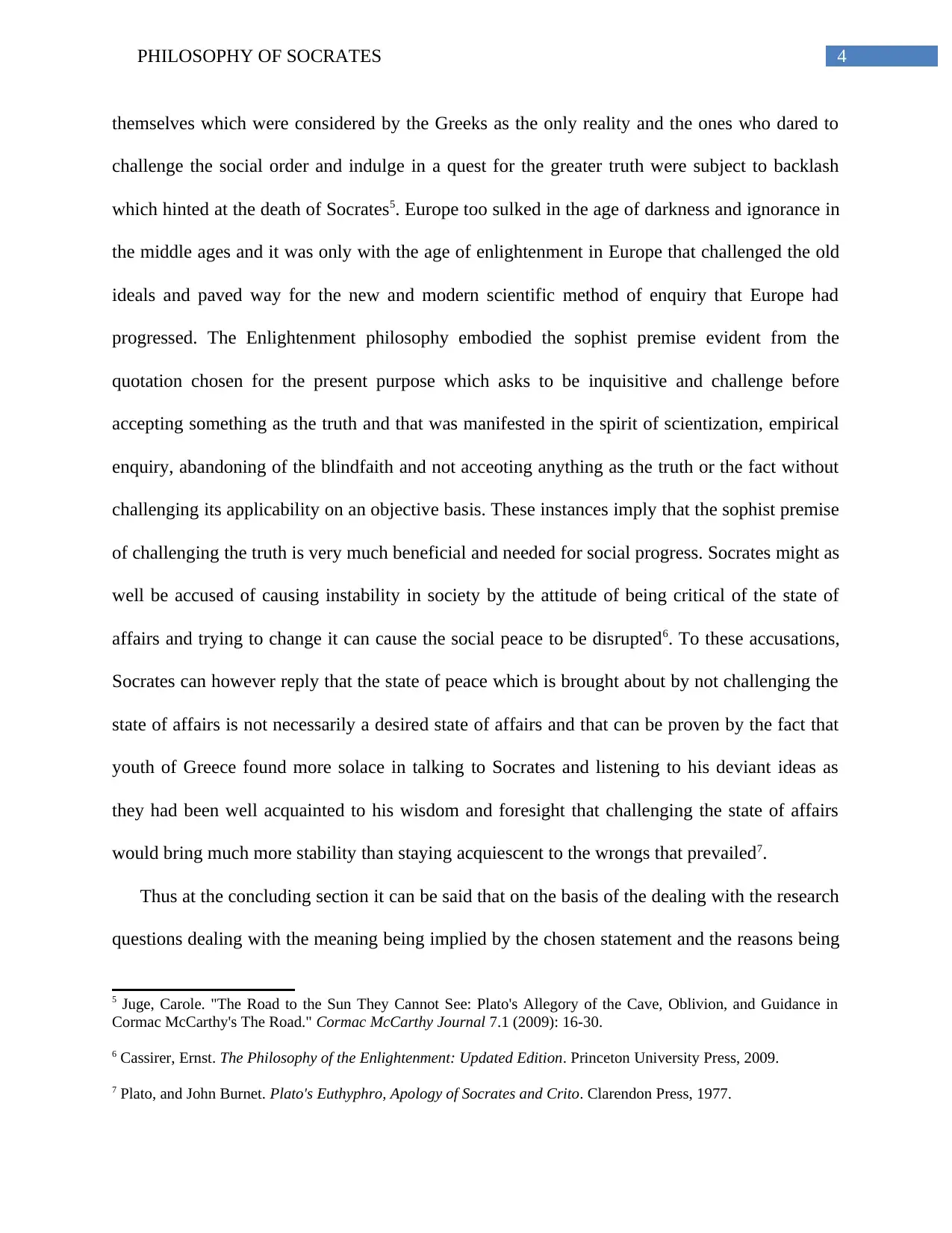
4PHILOSOPHY OF SOCRATES
themselves which were considered by the Greeks as the only reality and the ones who dared to
challenge the social order and indulge in a quest for the greater truth were subject to backlash
which hinted at the death of Socrates5. Europe too sulked in the age of darkness and ignorance in
the middle ages and it was only with the age of enlightenment in Europe that challenged the old
ideals and paved way for the new and modern scientific method of enquiry that Europe had
progressed. The Enlightenment philosophy embodied the sophist premise evident from the
quotation chosen for the present purpose which asks to be inquisitive and challenge before
accepting something as the truth and that was manifested in the spirit of scientization, empirical
enquiry, abandoning of the blindfaith and not acceoting anything as the truth or the fact without
challenging its applicability on an objective basis. These instances imply that the sophist premise
of challenging the truth is very much beneficial and needed for social progress. Socrates might as
well be accused of causing instability in society by the attitude of being critical of the state of
affairs and trying to change it can cause the social peace to be disrupted6. To these accusations,
Socrates can however reply that the state of peace which is brought about by not challenging the
state of affairs is not necessarily a desired state of affairs and that can be proven by the fact that
youth of Greece found more solace in talking to Socrates and listening to his deviant ideas as
they had been well acquainted to his wisdom and foresight that challenging the state of affairs
would bring much more stability than staying acquiescent to the wrongs that prevailed7.
Thus at the concluding section it can be said that on the basis of the dealing with the research
questions dealing with the meaning being implied by the chosen statement and the reasons being
5 Juge, Carole. "The Road to the Sun They Cannot See: Plato's Allegory of the Cave, Oblivion, and Guidance in
Cormac McCarthy's The Road." Cormac McCarthy Journal 7.1 (2009): 16-30.
6 Cassirer, Ernst. The Philosophy of the Enlightenment: Updated Edition. Princeton University Press, 2009.
7 Plato, and John Burnet. Plato's Euthyphro, Apology of Socrates and Crito. Clarendon Press, 1977.
themselves which were considered by the Greeks as the only reality and the ones who dared to
challenge the social order and indulge in a quest for the greater truth were subject to backlash
which hinted at the death of Socrates5. Europe too sulked in the age of darkness and ignorance in
the middle ages and it was only with the age of enlightenment in Europe that challenged the old
ideals and paved way for the new and modern scientific method of enquiry that Europe had
progressed. The Enlightenment philosophy embodied the sophist premise evident from the
quotation chosen for the present purpose which asks to be inquisitive and challenge before
accepting something as the truth and that was manifested in the spirit of scientization, empirical
enquiry, abandoning of the blindfaith and not acceoting anything as the truth or the fact without
challenging its applicability on an objective basis. These instances imply that the sophist premise
of challenging the truth is very much beneficial and needed for social progress. Socrates might as
well be accused of causing instability in society by the attitude of being critical of the state of
affairs and trying to change it can cause the social peace to be disrupted6. To these accusations,
Socrates can however reply that the state of peace which is brought about by not challenging the
state of affairs is not necessarily a desired state of affairs and that can be proven by the fact that
youth of Greece found more solace in talking to Socrates and listening to his deviant ideas as
they had been well acquainted to his wisdom and foresight that challenging the state of affairs
would bring much more stability than staying acquiescent to the wrongs that prevailed7.
Thus at the concluding section it can be said that on the basis of the dealing with the research
questions dealing with the meaning being implied by the chosen statement and the reasons being
5 Juge, Carole. "The Road to the Sun They Cannot See: Plato's Allegory of the Cave, Oblivion, and Guidance in
Cormac McCarthy's The Road." Cormac McCarthy Journal 7.1 (2009): 16-30.
6 Cassirer, Ernst. The Philosophy of the Enlightenment: Updated Edition. Princeton University Press, 2009.
7 Plato, and John Burnet. Plato's Euthyphro, Apology of Socrates and Crito. Clarendon Press, 1977.
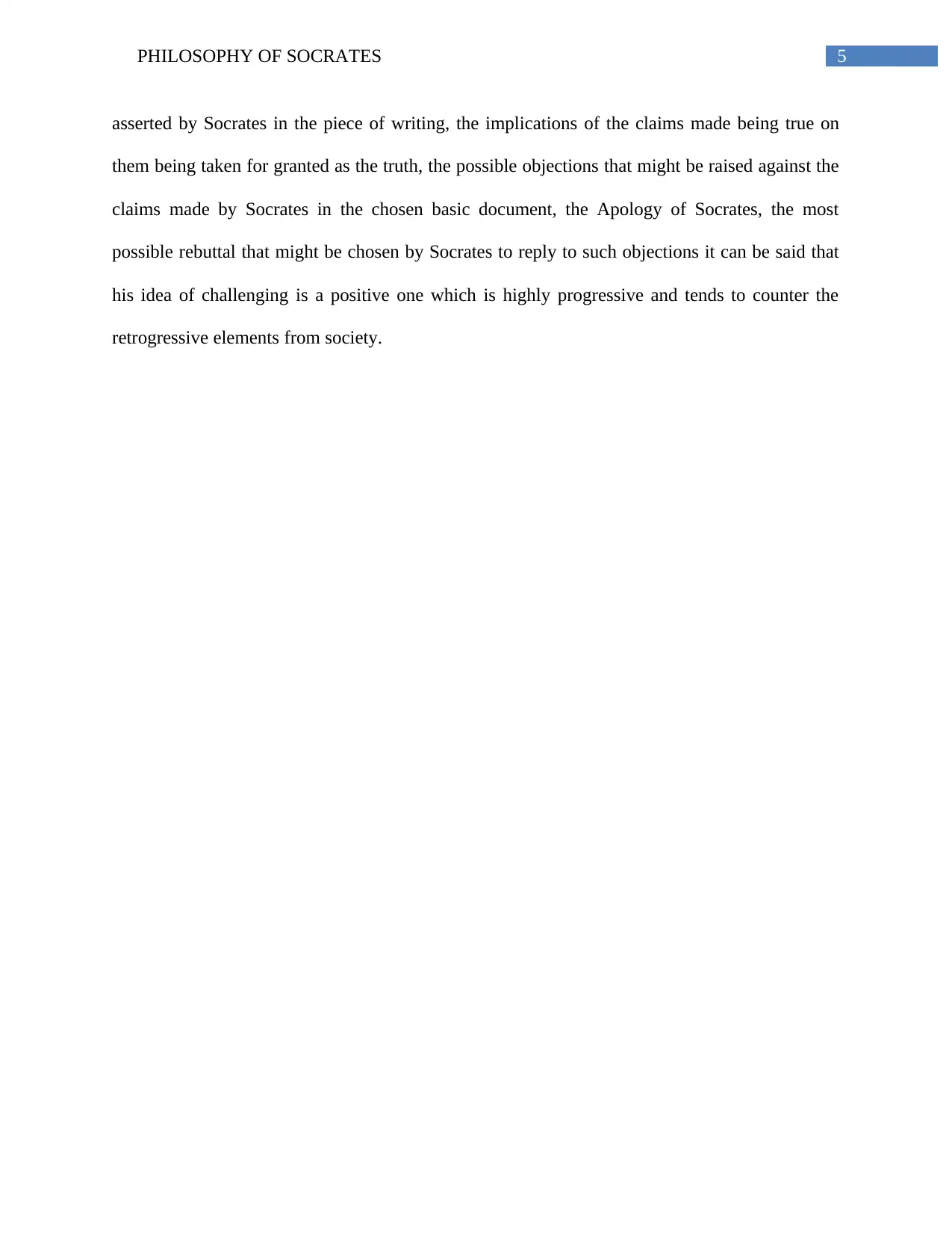
5PHILOSOPHY OF SOCRATES
asserted by Socrates in the piece of writing, the implications of the claims made being true on
them being taken for granted as the truth, the possible objections that might be raised against the
claims made by Socrates in the chosen basic document, the Apology of Socrates, the most
possible rebuttal that might be chosen by Socrates to reply to such objections it can be said that
his idea of challenging is a positive one which is highly progressive and tends to counter the
retrogressive elements from society.
asserted by Socrates in the piece of writing, the implications of the claims made being true on
them being taken for granted as the truth, the possible objections that might be raised against the
claims made by Socrates in the chosen basic document, the Apology of Socrates, the most
possible rebuttal that might be chosen by Socrates to reply to such objections it can be said that
his idea of challenging is a positive one which is highly progressive and tends to counter the
retrogressive elements from society.
⊘ This is a preview!⊘
Do you want full access?
Subscribe today to unlock all pages.

Trusted by 1+ million students worldwide
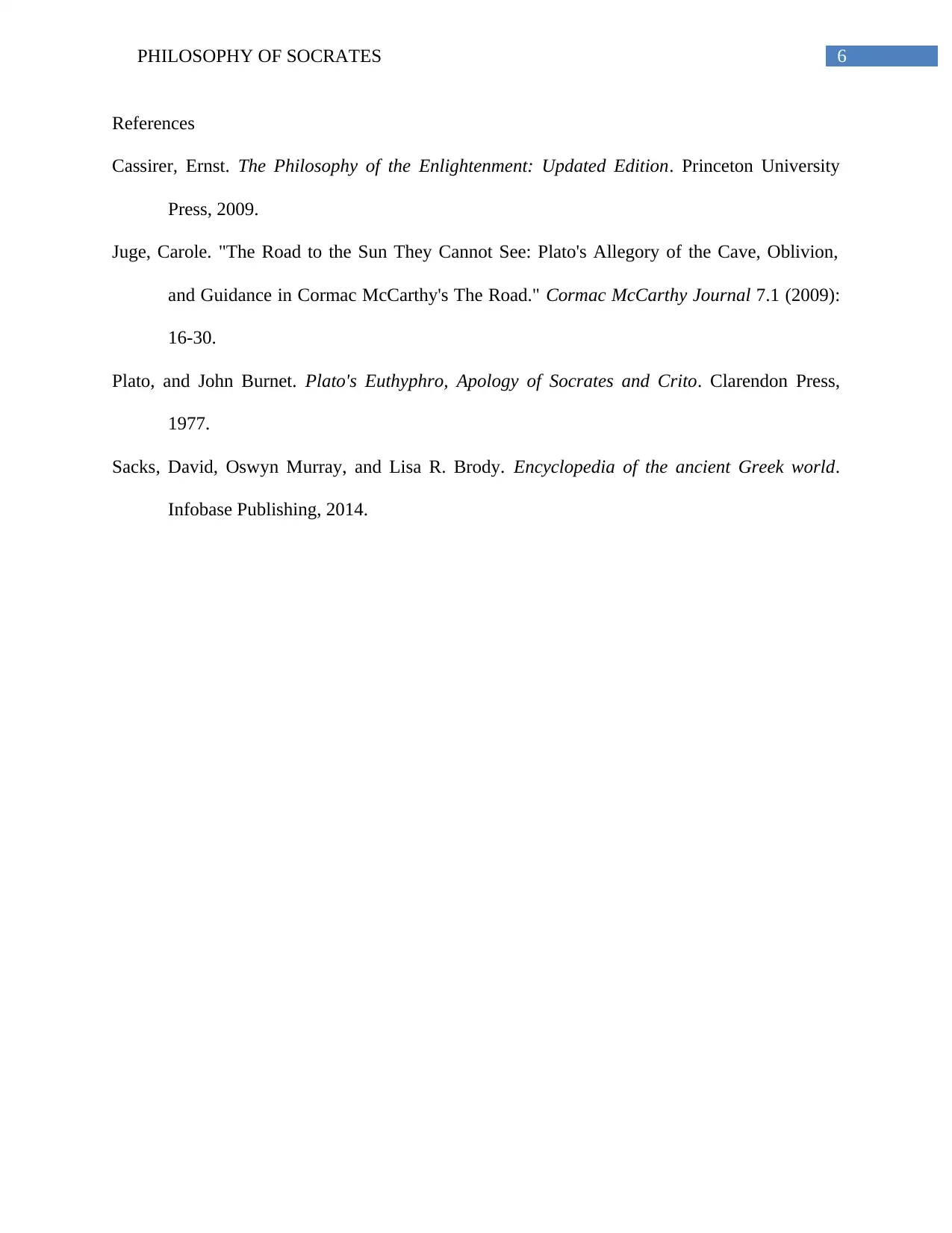
6PHILOSOPHY OF SOCRATES
References
Cassirer, Ernst. The Philosophy of the Enlightenment: Updated Edition. Princeton University
Press, 2009.
Juge, Carole. "The Road to the Sun They Cannot See: Plato's Allegory of the Cave, Oblivion,
and Guidance in Cormac McCarthy's The Road." Cormac McCarthy Journal 7.1 (2009):
16-30.
Plato, and John Burnet. Plato's Euthyphro, Apology of Socrates and Crito. Clarendon Press,
1977.
Sacks, David, Oswyn Murray, and Lisa R. Brody. Encyclopedia of the ancient Greek world.
Infobase Publishing, 2014.
References
Cassirer, Ernst. The Philosophy of the Enlightenment: Updated Edition. Princeton University
Press, 2009.
Juge, Carole. "The Road to the Sun They Cannot See: Plato's Allegory of the Cave, Oblivion,
and Guidance in Cormac McCarthy's The Road." Cormac McCarthy Journal 7.1 (2009):
16-30.
Plato, and John Burnet. Plato's Euthyphro, Apology of Socrates and Crito. Clarendon Press,
1977.
Sacks, David, Oswyn Murray, and Lisa R. Brody. Encyclopedia of the ancient Greek world.
Infobase Publishing, 2014.
1 out of 7
Your All-in-One AI-Powered Toolkit for Academic Success.
+13062052269
info@desklib.com
Available 24*7 on WhatsApp / Email
![[object Object]](/_next/static/media/star-bottom.7253800d.svg)
Unlock your academic potential
Copyright © 2020–2025 A2Z Services. All Rights Reserved. Developed and managed by ZUCOL.